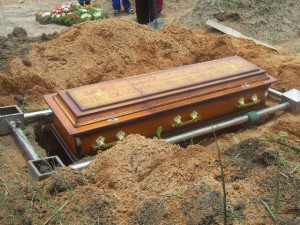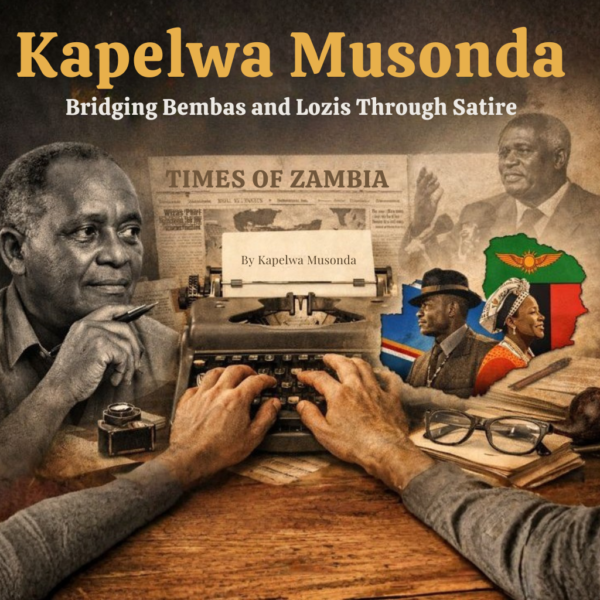
Who is going to be the DJ at your own funeral? Which hip hop artist is going to rap on the grand occasion? Which motivational speaker will motivate the mourners on the day of your burial? Yes, have you made a specific plan of how you want to be sent off from this present world?
Thirty or more years ago, it was considered a taboo in Zambia for one to ask such questions. I would have been considered either insane or a cursed soul to even think such thoughts. The attitude of Zambians towards death was quite different from the way it is now. Over the years, there has been a dramatic change in the way Zambians view death.
In this article, I would like to discuss some of these changes by contrasting the way people mourned their departed ones in the 60/70s and the way they do now.
My views are based on my personal experiences and my observation of the behavior of people in Kitwe over the past fifty years.
In the days gone by, the announcement of someone’s passing away was done in a rather protracted manner. I recall many occasions when a visitor would come to our home for the purpose of announcing the passing away of someone either in the village or Kitwe itself.
The visitor would engage in all manner of conversation far removed from the purpose of their visit. On a few instances, they would even accept the offer of a meal. It was only at the point of their leaving that they would say something like this:
“I’m leaving now, but we are not well.”
The listeners would observe a rather long period of silence in order to prepare themselves to receive the bad news. The visitor would then solemnly announce that such and such a person had left us.
Loud wailing would ensue from the women in the room. If only the men were around, there would be silence for even up to thirty minutes. Only then would the visitor proceed to explain the details regarding the death.
Nowadays, all it takes to announce the passing away of a loved one is a phone call, or simply a mobile phone text message.

In the past, when anyone died, everyone in the neighborhood was involved in the funeral of the departed soul. No music of any type would be heard from any home in the neighborhood. The children in the neighborhood would abstain from any form of play within the vicinity for the duration of the funeral.
Nowadays, it is normal for a family to throw a birthday for a member of the family in their home while a funeral is in progress next door. It is normal, too, for children to play a game of football near the funeral house, with the ball frequently straying into the yard of the funeral house.
In the past, funerals were solemn occasions. Sorrowful wailing and chants from the women would be heard periodically throughout the period of mourning. The only music heard during funerals consisted of solemn hymns from the bereaved family’s denomination.
There was a specific way in which women were expected to approach the funeral house. When women were about thirty meters from the funeral house, they would break into loud wailing until they entered the house.
There was very little conversation during a funeral those days. If there was any, it was of a serious and solemn nature. I do not remember ever hearing any laughter at a funeral in those days.
I remember once accompanying my mother and two aunties to a funeral of a relative. The women were chatting and laughing all the way to the funeral. Suddenly one of my aunties reminded the others that they were near the house where the funeral was taking place. The women stopped and wrapped loin cloths around their waist over their dresses and carefully wore black headkerchiefs which they had carried in their handbags.
I was quite fascinated when the three women suddenly broke out into loud cries and proceeded to enter the funeral house.
These days, funerals are lively occasions. There is relatively very little wailing and the conversation among the mourners revolves around current events. It is no exaggeration to state that some of the best jokes are heard around the funeral fire where the men sit outside the house throughout the night.

In the past, funerals were protracted affairs. The older and the more respected in the family the deceased was, the longer the period of mourning. This was done to show the respect accorded to the departed soul. It was not unusual to have a funeral stretching over a full week.
These days, three days seems to be the standard. In a few cases, a burial can take place within two days, especially if the death follows a long period of illness.
Those days, people were expected to look unkempt during the period of mourning. The widow or widower was not allowed to take a bath or to change her or his clothes until after the funeral. Mourners adorned old clothes for the funeral. Women wore black head bands while close male relatives sometimes tied black ribbons of cloth around their upper arms.
These days, women wear expensive in-fashion suits and mini-skirts at funerals while the men wear smart suits of any color. The women visit salons to have their hair set in the latest style.

In the 60s and 70s, when a funeral procession was passing, every pedestrian, without exception, stopped and stood still with their faces turned to the ground to show their respect for the departed soul. Oncoming vehicles stopped on the side of the road until the procession had passed. It was taboo for anyone to overtake a funeral procession, even on the high way.
These days no one seems to pay any notice to a passing funeral procession. Drivers no longer stop and they freely overtake the hearse.
In the old days, funerals were regarded as being more important than one’s work. If a boss refused to give permission to a worker to attend his or her relative’s funeral, the boss could be fired for inhuman behavior!
European bosses were astonished by the apparent fact that a Zambian employee’s father would seem to die several times, sometimes even three times in a week! The confusion arose from the use of the word “father” in most Zambian languages to refer to ones paternal uncles as well as ones father.
Nowadays you can get fired for attending too many funerals. Employees are required to register the members of their immediate family. They are now only permitted to attend the funerals of family members on this list if they are to do so in company time.
I anticipate more radical changed in the way Zambians mourn their departed ones.
For instance, Zambians are generally opposed to the idea of incinerating their dead, but the ever-increasing scarcity of land will make incineration the most logical choice.
I imagine that funerals will be made more entertaining by including more unconventional entertainment programmes such as beauty pageants and dancing competitions.
It is possible that people will no longer physically gather in one place to mourn the departed but will instead mourn them through Facebook or some other social network on the Internet.
If you think these thoughts are wild and far-fetched, I dare you to stick around for the next thirty years.
_________________________________________________________________
John Katebe is a professional speaker and writer with John Katebe Talks And Seminars.
John conducts Total Success Training .
Email: jkatebepresents@gmail.com
_______________________


I was just thinking: My dear friend, John Katebe’s take on funerals* and how Africans mourn makes very interesting reading. In fact, it got me reflecting on some of the crazy things that take place at funeral gatherings these days.
I don’t think there’s anyone who loves funerals except those who go hunting for one so as to have three square meals during these hard times. You will find young men in their teens singing and dancing. Some will even help cutting firewood and keeping the fire going all night. To them, it’s a free for all smorgasbord (simply put a restaurant where you pay once and eat as much as you like). Ask them who it is that they are mourning; you get an answer like, “Anali munzatu maningi”, (“He was a good friend of ours”). But if you really checked, you will discover that the departed is a 99 year-old great-grandmother from the village who came on a visit and died from cholera after a couple of days.
What about those, especially women, who start screaming from the gate, roll in the dirt all the way to the front door and then get carried into the house? Just offer them a doughnut and you’ll see how quickly they get delivered from the spirit of weeping and rolling in the dirt. They’ll even ask you for a ‘pint’ to wash down the doughnut.
At body viewing, some will even attempt to grab the dead person and lift them out of the coffin. I would let them go ahead for as long as they want and see whether they succeed in doing a “Lazarus, come forth!”, or even get to bury the person.
Now the men; the men are interesting. Heads shaking, tears flowing from one eye, while the other eye takes a panoramic view of the household contents. See, don’t mind the pun, only one eye can shed a tear because if both are flowing, vision is blurred and one might miss some valuables to be grabbed. “Ah! The fridge is working and that 42 inch flat screen TV will sit well in my living room back in the village. I can buy a solar panel when I get my share of the money. Is that an 8 inch Foam King mattress I see them sitting on? Must check if I can dig up that swimming pool and carry it with me. Nice fish pond.”
Not long ago, a certain lady from the village packed her dead sister’s household goods, including cell phone and washing line! All this a day after burial. In the evening, there were no pots for cooking coz they were all tied up in a blanket! True story.
Now white folks are different. White folks mourn silently, orderly. A friend may pass by and ask if you want an aspirin or something to make you sleep and then leave after a few minutes. They will show up at the burial, pass by your home for a cup of coffee and go home. You are left alone with nobody eyeing the 42 inch flat screen TV. No one even notices you’ve got one. Sad and lonely.
If you ever get a chance to visit the National Museum in Cairo, Egypt, you’ll see what looks like shipping containers with all the dead Pharaoh’s possessions. Even some of the slaves were buried along with their master. Nothing was left to be grabbed by vulture relatives. What a way to go!
It’s just a thought.
The fact that this article made me laugh all the way through proves that indeed, funerals are becoming a less and less sombre subject by the day. Fabulous article!
I will be happy to get more such stuff.